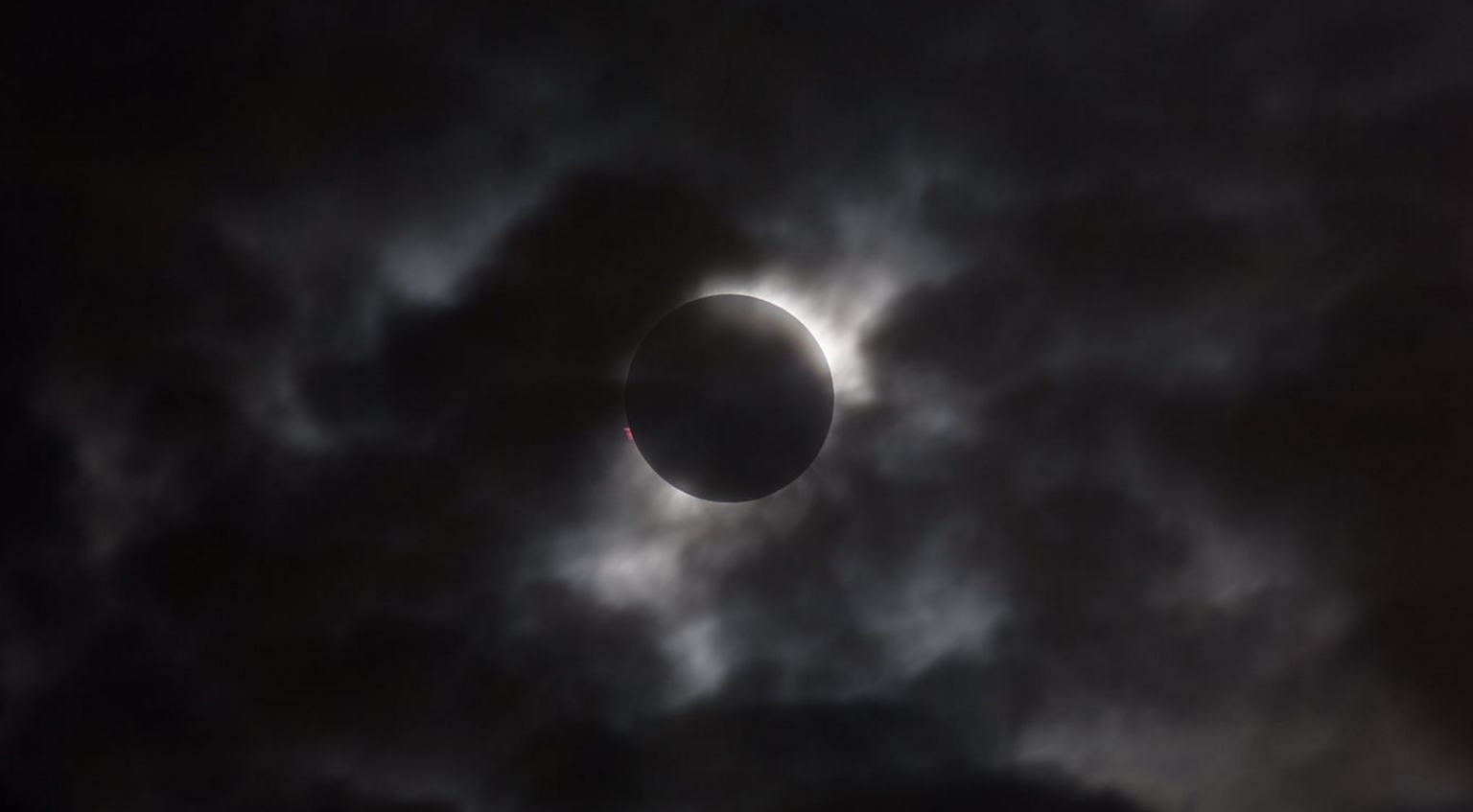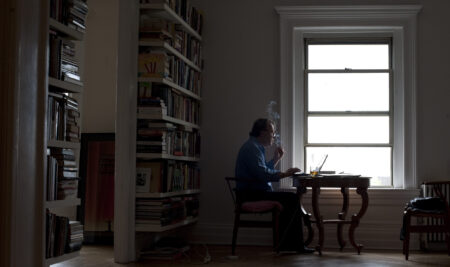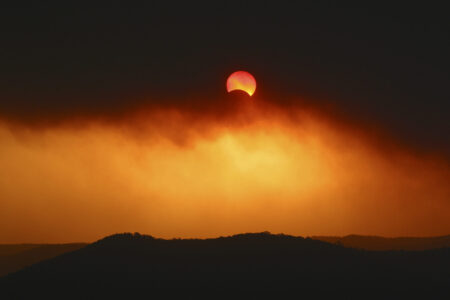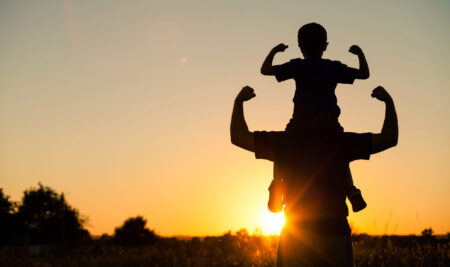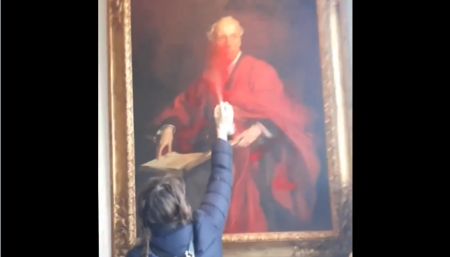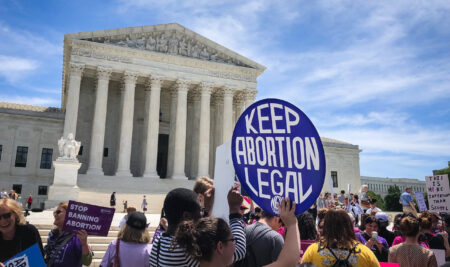On Monday, the wife and I piled our kids into the Subaru and drove three hours to northern New Hampshire to see the eclipse at 100 percent totality. Aside from all the unwelcome visitors from Massachusetts and Rhode Island, it was a very pleasant trip. Passing beneath the White Mountains brought tears to my eyes, as it always does. Growing up in farm country, all I knew were fields and forests. Mountains I only knew from books—in particular my favorite book, Lost Horizon. I tried to imagine what they would look like (“hills, only four hundred stories tall”). Still, I knew that once I saw a real mountain all my fantasies would be put to shame. And so they were.
We’d planned on camping out somewhere in the town of Lancaster, which was directly in the eclipse’s pathway. But even before we met the highway, we saw that hundreds of our fellow looky-loos were simply pulling over on the highway and camping out there. Friends of ours had made reservations to stay in Lancaster the night before; they texted to warn us that traffic was gridlocked when they drove up on Sunday afternoon, a good twenty-four hours before the eclipse even began. A little patch of gravel next to the highway was probably the best we could hope for. So, we snagged the first spot we saw. This was about half an hour before the eclipse began.
We hiked up the road a bit and found a field where folks were setting up folding chairs, flying drones, and fidgeting with their ultra-stylish eclipse glasses. The mood was ebullient. There was a rumor that the Town of Lancaster would be setting off fireworks. Folks were playing music and toying around with drones. Children were playing tag in the field. It was like the tailgate at a Patriots game. Everyone was brought together in that field by a common purpose, and that gave us a sense of camaraderie.
Then, about twenty minutes before 100 percent totality, it became noticeably darker—and colder. I had expected both, but it was a bit like the mountains: Nothing in my imagination prepared me for the real thing.
For those who don’t know, the darkness of an eclipse is nothing like the darkness of nightfall. Partially it’s because it becomes so dark so quickly. But I think it’s also because the sun isn’t setting in the West. The shadows don’t lengthen. It doesn’t give off a few last warm, golden rays before dropping behind the horizon. It just… turns off.
What little light remained was gray, almost sickly. My wife said, “It’s like when you edit a photo and turn ‘saturation’ all the way down.” That’s exactly right. The rational part of my brain knew I wasn’t going blind, but I couldn’t quite drive away that fear. And it quickly became clear that the same fear was creeping over our 3-year-old, Beatrice. She started looking around and rubbing her eyes. A look came over her face, half-sad, half-panicked. She looked at me, silently pleading for me to comfort her, clearly hoping that if she didn’t say that she was scared, it would all go away quickly.
It didn’t—not for her, not for me, and not for anyone else. As the darkness grew, everyone in the field slowly went silent. Hundreds of strangers were gradually overcome by fear and awe. A group of girls to our right started talking about the Rapture. A man to our right whispered to his wife, “It’s the end of the world.”
Some folks had driven three or four hours to witness a 30-second event—and yet, as soon as it began, it was clear that everyone wanted it to be over. Nobody was having fun. All the children stood riveted to the earth in fright or burst into tears. The grown-ups looked around nervously. Obviously, we all half-expected something else to happen. What that something is (the Rapture or the Apocalypse or what) was almost beside the point. It felt like a portent, like it was pointing to something else.
Imagine you’re at a crowded beach reading in the sun or splashing in the waves, and suddenly you hear the blast of a huge trumpet come from somewhere across the sea. Everyone on the beach might have a different theory about what the trumpet means, but everyone would agree that it means something. The trumpet doesn’t want your attention: it wants you to be still and silent, attentive to whatever comes next. This horrible mood of anticipation was thick in the air on Monday at 3:30 p.m. in Lancaster, New Hampshire.
When the eclipse ended and the light returned, I found myself holding my prayer rope and whispering, “Lord Jesus Christ, have mercy on me.” There was a palpable sense of relief, bewilderment, and shame in our field. Everyone packed up, quietly and quickly, and hit the road. There were a few tear-stained cheeks and quite a lot of nervous smiles. Some folks tried to make small talk. I said to my wife, “No one liked it.”
Let me state for the record that I had no particular interest in the eclipse. For me, it was an excuse to take the day off and spend time with my family; I certainly wasn’t expecting article-fodder. My wife was quite excited, as was everyone else gathering on the side of the highway. And I really don’t think a single one of us left that field without a deep, nameless dread in our hearts. But how many of us would tell the local reporter hunting for a human-interest story? How many would post about it on Facebook or Instagram? How many would tell our families? How many would admit it to ourselves?
By the way, I don’t say that in judgment. I spend a lot of time thinking about religion and the “supernatural.” I’ve seen demons; I’ve witnessed miracles. But what I felt watching the eclipse was something else. It was as if Reality itself had cracked open, and we all saw something on the other side.
I’m a proud and Orthodox Christian; I could give my particular theory about the nature of that something. We all had our expectations, and we were all wrong. The question is, what do we do now? Do we bury that feeling and rewrite the memory to seem more cheerful? Or do we go looking for that something whose darkness outshone the sun?
This is one of those moments in life where the mundane world peels away like old wallpaper. We realize that our existence doesn’t work the way we thought it did. The first time you hold your firstborn is one example. The first time you watch someone die is another. I believe we’ll be judged on how we respond to such moments. It’s not so much about finding the right answers. It’s about having the courage to ask the right questions—the ones that are (literally) staring us in the face. Those who seek will find, but how many of us seek?
Read the full article here





